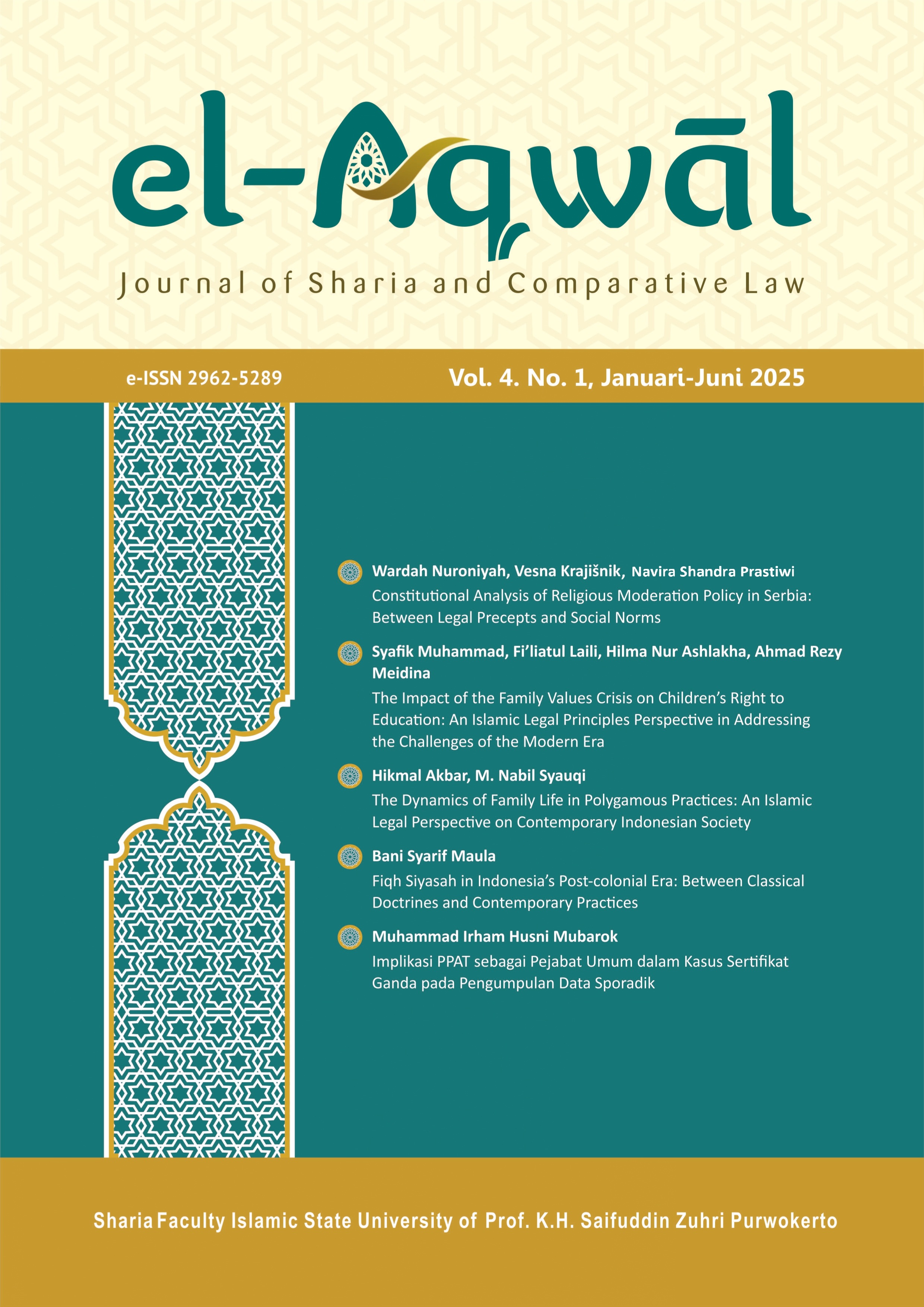Fiqh Siyasah in Indonesia’s Post-colonial Era: Between Classical Doctrines and Contemporary Practices
DOI:
https://doi.org/10.24090/el-aqwal.v4i1.13610Kata Kunci:
Fiqh Siyasa, Islamic state, post-colonial, IndonesiaAbstrak
This study examines contemporary understandings of Fiqh Siyasah—a branch of Islamic legal thought concerned with governance and political relations—within Islamist movements in post-Reformasi Indonesia. Fiqh Siyasah contains foundational principles that govern the relationship between the state and its citizens, as well as between Muslims and non-Muslims. Despite its significance, Fiqh Siyasah has seen limited application in the modern era, particularly after the imposition of Western legal systems during the colonial period. The research explores how post-colonial Islamist groups interpret legal provisions within Fiqh Siyasah, with a specific focus on doctrines related to war (harb) and peace (sulh). This focus is especially relevant given recurring societal tensions triggered by demands for the implementation of Sharia law by certain Islamic groups. Utilizing a qualitative methodology and a process tracing approach, the study finds that Muslim interpretations of Qur’anic verses pertaining to conflict and relations with non-Muslims are diverse and often context-dependent. While many Islamist groups share a common ideological aim of establishing Sharia law, their strategies and theological positions vary significantly. Not all are radical in orientation, and not all radical organizations adhere to the doctrine of dividing the world into dār al-Islām (abode of Islam) and dār al-harb (abode of war). These findings highlight the complexity and internal plurality of contemporary Islamic political thought in Indonesia.Unduhan
Referensi
Afandi, Muhrisun. “Gurutta and Religious Authority Contestation in Makassar.” In Politics, Ulama, and Narratives of Nationhood: Fragmentation of Religious Authority in Indonesian Cities, 103–23. Jakarta: PPIM UIN Jakarta, 2019.
Alfitri. “Religion and Constitutional Practices in Indonesia: How Far Should the State Intervene in the Administration of Islam?” Asian Journal of Comparative Law 13, no. 2 (2018): 389–413.
An-Na’im, Abdullahi Ahmed. Islam and the Secular State: Negotiating the Future of Shari’a. Massachusetts: Harvard University Press, 2008.
Aqimuddin, Eka An, Neni Ruhaeni, and Nurul Chotidjah. “Dispute Settlement Between Islamic Law State and Non-Islamic Law State: An Islamic International Law Perspective.” KnE Social Sciences 8, no. 18 (2023): 46–53. https://doi.org/https://doi.org/10.18502/kss.v8i18.141.
Arkoun, Mohammed. The Unthought in Contemporary Islamic Thought. London: Saqi Books, 2002.
Azra, Azyumardi. Pergolakan Politik Islam: Dari Fundamentalisme, Modernisme Hingga Post-Modernisme. Jakarta: Paramadina, 1996.
Badawi, Jamal. “Muslim/Non-Muslim Relations: An Integrative Approach.” J. Islamic L. & Culture 8 (2003): 23.
Barizi, Muhammad. “Reading the Qur’an from the Contemporary Approach of Maqāṣid Al-Sharī’a (A Case Study of Non-Muslim Leadership in Indonesia).” Ulumuna Journal of Islamic Studies 22, no. 1 (May 28, 2018): 112–32. https://doi.org/10.20414/ujis.v22i1.290.
Bello, Abdulmajeed Hassan. “Applying Hirāba in Islamic Criminal Law to Curb Armed Banditry in the Zamfara State of Nigeria: Opportunities and Challenges.” Mazahib: Jurnal Pemikiran Hukum Islam 20, no. 1 (June 25, 2021): 1–42. https://doi.org/10.21093/mj.v20i1.2959.
Bruinessen, Martin Van. Contemporary Developments in Indonesian Islam: Explaining the “Conservative Turn.” Singapore: Institute of Southeast Asian Studies, 2013.
Bush, Robin. Nahdlatul Ulama and the Struggle for Power within Islam and Politics in Indonesia. Singapore: Institute of Southeast Asian Studies, 2009.
Durham Jr, W Cole, and Brett G Scharffs. Law and Religion: National, International, and Comparative Perspectives. New York: Wolters Kluwer, 2019.
Esposito, John L. Islam and Politics. New York: Syracuse university press, 1998.
Farkhani, Farkhani, Elviandri Elviandri, Khudzaifah Dimyati, Absori Absori, and Muh Zuhri. “Converging Islamic and Religious Norms in Indonesia’s State Life Plurality.” Indonesian Journal of Islam and Muslim Societies 12, no. 2 (2022): 421–46.
Fealy, Greg, and Sally White. Expressing Islam: Religious Life and Politics in Indonesia. Singapore: Institute of Southeast Asian Studies, 2008.
Ghunaimi, Mohammad Talaat. The Muslim Conception of International Law and the Western Approach. New York: Springer Science & Business Media, 2012.
Hallaq, Wael. The Impossible State: Islam, Politics, and Modernity’s Moral Predicament. New York: Columbia University Press, 2012.
Hasan, Noorhaidi. Laskar Jihad: Islam, Militancy, and the Quest for Identity in Post-New Order Indonesia. New York: Southeast Asia Program Publications, 2006.
Hasan, Noorhaidi. “The Making of Public Islam: Piety, Agency, and Commodification on the Landscape of the Indonesian Public Sphere.” Contemporary Islam 3, no. 3 (2009): 229–50.
Hirschl, Ran. “Comparative Constitutional Law and Religion.” In Comparative Constitutional Law, edited by Tom Ginsburg and Rosalind Dixon, 422–40. Cheltenham: Edward Elgar, 2011.
Islam, Nasser Ul, and Showkat Hussian Dar. “Contemporary Discourse on Citizenship: An Islamic Perspective.” Islamic Research 6, no. 2 (2023): 122–28.
Lord, Karen. “Implicit Religion: A Contemporary Theory for the Relationships between Religion, State, and Society.” Journal of Contemporary Religion 23, no. 1 (2008): 33–46.
Lukito, Ratno. “State and Religion Continuum in Indonesia The Trajectory of Religious Establishment and Religious Freedom in the Constitution.” The Indonesian Journal of International & Comparative Law 5, no. 4 (2018): 645.
Machmudi, Yon. “The Re-Emergence of the Indonesian Islamic State Groups: Their Survival and Modus Operandi.” International Journal of Islam in Asia 1, no. 2 (2021): 211–32.
March, Andrew R. “The Transformation of Islamic Law in Modernity.” In The Oxford Handbook of the Sociology of the Middle East, edited by Armando Salvatore, Sari Hanafi, and Kieko Obuse, 319–35. New York: Oxford University Press, 2022.
Marzuki, Ismail. “Diskursus Khilafah Dalam Kajian Fiqh Siyasah Klasik Dan Kontemporer.” Al-Manahij: Jurnal Kajian Hukum Islam 15, no. 2 (2021): 325–344. https://doi.org/10.24090/mnh.v15i2.4159.
Maula, Bani Syarif. “Post-Islamism and the Rise of Sharia Laws in Contemporary Indonesia: Aspirations of Implementing Islamic Laws in a Democratic Era.” International Journal of Social Science and Religion (IJSSR) 4, no. 2 (2023): 163–84.
Maula, Bani Syarif. “The State Legal Policies on Sharia Application in Changing Pattern of Indonesia’s Islamic Movements.” Al Hurriyah: Jurnal Hukum Islam 7, no. 1 (2022): 15–30.
Muhammad, Al-Atawneh. “Religion and State in Contemporary Middle East: The Case of Saudi Arabia.” J. Islamic St. Prac. Int’l L. 2 (2006): 28.
Parray, Tauseef Ahmad. Islam and Democracy in the 21st Century. Oxford: Oxford University Press, 2023.
Qardawi, Yusuf al-. Fiqh Al-Jihad: Dirasah Muqaranah Li Ahkamihi Wa Filsafatihi Fi Dhaui Al-Qur’an Wa Al-Sunnah. Cairo: Maktabah Wahbah, 2010.
Quraishi-Landes, Asifa. “Islamic Constitutionalism: Not Secular. Not Theocratic. Not Impossible.” Rutgers JL & Religion 16 (2014): 553.
Salim, Arskal. Challenging the Secular State: The Islamization of Law in Modern Indonesia. Hawaii: University of Hawaii Press, 2008.
Stahnke, Tad, and Robert C Blitt. “The Religion-State Relationship and the Right to Freedom of Religion or Belief: A Comparative Textual Analysis of the Constitutions of Predominantly Muslim Countries.” Georgetown Journal of International Law 36 (2004): 947–1078.
Taufik, Zulfan, and Muhammad Taufik. “Nagari Madani: Islamic Favoritism and Religious Freedom in Regional Development in West Sumatera, Indonesia.” Ulumuna Journal of Islamic Studies 27, no. 2 (December 31, 2023): 692–714. https://doi.org/10.20414/ujis.v27i2.669.
Tibi, Bassam. Islam and the Cultural Accomodation of Social Changes. Boulder, San Fransisco: Westview Press, 1991.
Vogel, Frank. “An Introduction to Law of the Islamic World.” International Journal of Legal Information 31, no. 2 (2003): 353–69.
Wahid, Din. “Kembalinya Konservatisme Islam Indonesia.” Studia Islamika 21, no. 2 (2014): 375–90. https://doi.org/https://doi.org/10.15408/sdi.v21i2.1043.
Zuhaili, Wahbah al-. Athar Al-Harb Fi Al-Fiqh Al-Islami: Dirasah Wa Al-Muqaranah. Damascus: Dār al-Fikr, 1998.
Unduhan
Diterbitkan
Cara Mengutip
Terbitan
Bagian
Lisensi
Hak Cipta (c) 2025 Bani Syarif Maula

Artikel ini berlisensiCreative Commons Attribution-ShareAlike 4.0 International License.
Authors who publish with this journal agree to the following terms: Authors retain copyright and grant the journal right of first publication with the work simultaneously licensed under a Creative Commons Attribution-ShareAlike 4.0 International License that allows others to share the work with an acknowledgment of the work's authorship and initial publication in this journal.












